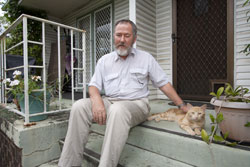
WHEN Rev Bob Harriman, Mary Burnett Presbytery Minister and former Chaplain for UnitingCare Community (formerly Lifeline), looks at church communities he doesn’t focus on who is there.
Mr Harriman is always on the lookout for the people who aren’t there.
It is about ensuring our churches are inclusive worship communities where different people feel that they belong.
He said inclusive worship communities “make us more fully human” and are what we are called to be as the body of Christ.
“One of the good things about the Luke 14 passage is the idea that we are called to God’s table,” he said.
“If we imagine we are sitting around the communion table for example, the question that comes to me is who is missing from around that table?
Are the people who are sitting here a reflection of the demographics of our local community?
“That calls us then to ask what we are hoping for missionally here, and it means that if we have 20 per cent of people (in
our community) who have a disability of some kind, including mobility issues from ageing and so forth, are we accommodating those people in our faith communities?”
Mr Harriman said that by engaging with people who are different to ourselves we learn more about ourselves and become “enriching” to others.
“The sad fact of history is that we have organised ourselves into groups of likeness … but the gospel calls us to be in groups of diversity; to take the risk of engaging with people who are different to ourselves.
“Within that stretch we actually become genuine followers of Jesus.
“Because we believe in a relational God that should be foundational as to how we see ourselves in the world.”
As a chaplain Mr Harriman has been part of many inclusive worship communities and events, but one event in particular stays with him.
“I was facilitating a worship experience called Worship with a Difference.
A number of people with disabilities came along, as did a number of gay and lesbian people.
It was an opportunity to be an inclusive worship community where the people themselves took part and contributed in any way they wanted.
“On one occasion there was a young man with Down Syndrome who decided to preside at communion.
He pointed out to everybody that the table and the bread and wine weren’t Bob’s anymore, they were the body and blood of Christ and that was what we were going to share.
He talked about the significance of Jesus giving himself for us and then he shared the bread and wine with everybody in the group.
“It was a really moving occasion and a great lesson to me.
Just because you have an intellectual disability doesn’t mean you don’t understand what is actually happening.
“When we open ourselves up to those possibilities God can teach us things that we are not going to learn any other way.”
Mr Harriman said people are often afraid to make a mistake when it comes to getting to know marginalised people.
“We have to put aside our concern about getting it right the first time.
The more difficult the communication is for us just means we need to take more time to get to know the person,” he said.
“Even if people have difficulty with words they can still communicate whether they like you or not, whether they think you are listening to them or not.
“If you are not sure that you heard something properly you can always say, ‘I’m sorry, I didn’t understand that’, or ‘I think I
heard you say this, is that right?’
You can always check it out; it just takes a bit longer.”
Mr Harriman said that the first step to ensuring a worship community is inclusive is to pray and reflect.
“We need to have an attitude that is about love towards people rather than some sort of intellectual or social exercise or
experiment.”
He said by establishing real friendships with people and listening to where they are in their life’s journey we are able to travel alongside people.
Mr Harriman is part of the Synod Advisory Group for Relating to People Experiencing Marginalisation which is working on developing resources to assist people.
“Very soon we will be offering workshops to help people work through how they might understand inclusive communities and how they might help to grow that.”
For more information contact Bob Harriman on ucamaryburnett@gmail.com
Photo : Rev Bob Harriman is passionate about creating inclusive worship communities where people of all walks of life and ability can belong. Photo by Osker Lau
 JourneyOnline
JourneyOnline






